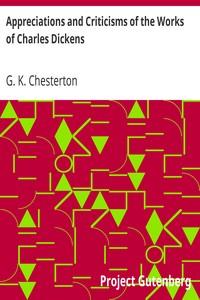Read this ebook for free! No credit card needed, absolutely nothing to pay.
Words: 72896 in 7 pages
This is an ebook sharing website. You can read the uploaded ebooks for free here. No credit cards needed, nothing to pay. If you want to own a digital copy of the ebook, or want to read offline with your favorite ebook-reader, then you can choose to buy and download the ebook.


: Appreciations and Criticisms of the Works of Charles Dickens by Chesterton G K Gilbert Keith - Dickens Charles 1812-1870 Criticism and interpretation
ing upon a cloudy hill. Rather they are all the more visible for being large. They come all the closer because they are colossal. Their queer features and weaknesses stand out large in a sort of gigantic domesticity, like the hairs and freckles of a Brobdingnagian. We feel the sombre Murdstone coming upon the house like a tall storm striding through the sky. We watch every pucker of Peggotty's peasant face in its moods of flinty prejudice or whimsical hesitation. We look up and feel that Aunt Betsey in her garden gloves was really terrible--especially her garden gloves. But one cannot avoid the impression that as the boy grows larger these figures grow smaller, and are not perhaps so completely satisfactory.
CHRISTMAS BOOKS
TALE OF TWO CITIES
It was well for him, at any rate, that the people rose in France. It was well for him, at any rate, that the guillotine was set up in the Place de la Concorde. Unconsciously, but not accidentally, Dickens was here working out the whole true comparison between swift revolutionism in Paris and slow evolutionism in London. Sidney Carton is one of those sublime ascetics whose head offends them, and who cut it off. For him at least it was better that the blood should flow in Paris than that the wine should flow any longer in London. And if I say that even now the guillotine might be the best cure for many a London lawyer, I ask you to believe that I am not merely flippant. But you will not believe it.
BARNABY RUDGE
It may be said that there is no comparison between that explosive opening of the intellect in Paris and an antiquated madman leading a knot of provincial Protestants. The Man of the Hill, says Victor Hugo somewhere, fights for an idea; the Man of the Forest for a prejudice. Nevertheless it remains true that the enemies of the red cap long attempted to represent it as a sham decoration in the style of Sim Tappertit. Long after the revolutionists had shown more than the qualities of men, it was common among lords and lacqueys to attribute to them the stagey and piratical pretentiousness of urchins. The kings called Napoleon's pistol a toy pistol even while it was holding up their coach and mastering their money or their lives; they called his sword a stage sword even while they ran away from it. Something of the same senile inconsistency can be found in an English and American habit common until recently: that of painting the South Americans at once as ruffians wading in carnage, and also as poltroons playing at war. They blame them first for the cruelty of having a fight; and then for the weakness of having a sham fight. Such, however, since the French Revolution and before it, has been the fatuous attitude of certain Anglo-Saxons towards the whole revolutionary tradition. Sim Tappertit was a sort of answer to everything; and the young men were mocked as 'prentices long after they were masters. The rising fortune of the South American republics to-day is symbolical and even menacing of many things; and it may be that the romance of riot will not be so much extinguished as extended; and nearer home we may have boys being boys again, and in London the cry of "clubs."
THE UNCOMMERCIAL TRAVELLER
This riotous realism of Dickens has its disadvantage--a disadvantage that comes out more clearly in these casual sketches than in his constructed romances. One grave defect in his greatness is that he was altogether too indifferent to theories. On large matters he went right by the very largeness of his mind; but in small matters he suffered from the lack of any logical test and ready reckoner. Hence his comment upon the details of civilisation or reform are sometimes apt to be jerky and jarring, and even grossly inconsistent. So long as a thing was heroic enough to admire, Dickens admired it; whenever it was absurd enough to laugh at he laughed at it: so far he was on sure ground. But about all the small human projects that lie between the extremes of the sublime and the ridiculous, his criticism was apt to have an accidental quality. As Matthew Arnold said of the remarks of the Young Man from the Country about the perambulator, they are felt not to be at the heart of the situation. On a great many occasions the Uncommercial Traveller seems, like other hasty travellers, to be criticising elements and institutions which he has quite inadequately understood; and once or twice the Uncommercial Traveller might almost as well be a Commercial Traveller for all he knows of the countryside.
I take this one instance of the excellent article called "Nurse's Stories" because it is quite typical of all the rest. Dickens was really deep about human beings; that is, he was original and creative about them. But about ideas he did tend to be a little superficial. He judged them by whether they hit him, and not by what they were trying to hit. Thus in this book the great wizard of the Christmas ghosts seems almost the enemy of ghost stories; thus the almost melodramatic moralist who created Ralph Nickleby and Jonas Chuzzlewit cannot see the point in original sin; thus the great denouncer of official oppression in England may be found far too indulgent to the basest aspects of the modern police. His theories were less important than his creations, because he was a man of genius. But he himself thought his theories the more important, because he was a man.
SKETCHES BY BOZ
They must, I think, be read in the light of this youthful explosion. In some psychological sense he had really been wronged. But he had only become conscious of his wrongs as his wrongs had been gradually righted. Similarly, it has often been found that a man who can patiently endure penal servitude through a judicial blunder will nevertheless, when once his cause is well asserted, quarrel about the amount of compensation or complain of small slights in his professional existence. These are the marks of the first literary action of Dickens. It has in it all the peculiar hardness of youth; a hardness which in those who have in any way been unfairly treated reaches even to impudence. It is a terrible thing for any man to find out that his elders are wrong. And this almost unkindly courage of youth must partly be held responsible for the smartness of Dickens, that almost offensive smartness which in these earlier books of his sometimes irritates us like the showy gibes in the tall talk of a school-boy. These first pages bear witness both to the energy of his genius and also to its unenlightenment; he seems more ignorant and more cocksure than so great a man should be. Dickens was never stupid, but he was sometimes silly; and he is occasionally silly here.
PICKWICK PAPERS
Free books android app tbrJar TBR JAR Read Free books online gutenberg
More posts by @FreeBooks









